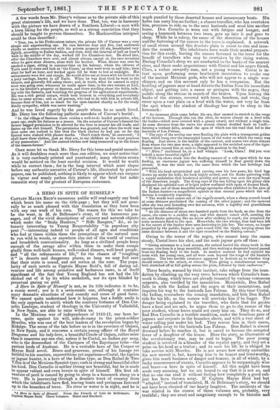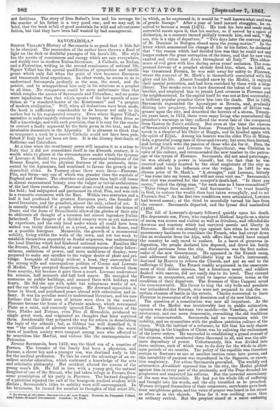A HERO IN SPITE OF HIMSELF.* CAPTAIN MAYNE Rain's numerous
public will read eagerly any book which bears his name on the title-page ; but they will not gene- rally be as much pleased with this translation as they have been with any one work of his own. The reason for this we take to be the want, in M. de Bellemare's story, of the humorous pas- sages, and of the vivid descriptions of scenery and natural objects which make the " Scalp Hunters," " Rifle Rangers," &c., so in- tensely interesting to Young Respectability " in populous city pent ;"—interesting indeed to people of all ages and conditions who feel at times within them the promptings of the natural man to run wild in woods, or anywhere else out of the world of routine and broadcloth conventionality. As long as a civilized people keep enough of the savage alive within them to make them escape gladly from well-built houses, well-cooked dinners, well-bred people, and " all the refinements of life," for the chance of "roughing it" in deserts and dangerous places, so long we may feel sure that their state is sound, and not rotten at the core. The popu- larity of such novels as Captain Mayne Reid's, full of daring ad- venture and life among primitive and barbarous races, is of itself significant of the fact that Young England has not had the life choked out of it by its white neckcloth, nor its eyes blinded by perpetual gazing on gold.
Hero in Spite of Himself is not, as its title indicates it to be, a comic novel; nor is it a serio-comic one, although it contains many dramatic situations of real comedy and some of good farce. We cannot quite understand how it happens, but a feeble smile is the only approach to mirth which the contrary fortunes of Don Cor- nelio Lantejas, student of theology in the University of Valladolid, in New Spain, are able to raise within us. In the Mexican war of independence of 1810-II, our hero be- came, quite against his will, aide-de-camp to the priest-soldier Morelos, who was one of the best leaders of the revolution begun by Hidalgo. The scene of the tale before us is in the province of Oajaca, in New Spain, and it concerns a certain young officer of the Royal Dragoons and his lady-love, a beautiful Creole of Oajaca, rather more than it concerns any one else, unless it be Costal, an Indian par sang, who is the descendant of the Caciques of the Zapotaque tribe—the ancient lords of Anahuac. He is a veritable hero of the Cooper or Mayne Reid novel. Brave and generous, proud of his lineage yet faithful to his masters, superstitions yet sagacious—Costal, the tigrere or jaguar hunter, is a hero of the Indian type, as Don Rafael de Tres Villas is of the Mexican-Spanish type; each is strong and beautiful after his kind. Don Cornelio is neither strong nor beautiful, but he is made to appear valiant and even heroic in spite of himself. His first ad- venture of peril is caused by going to sleep in a hammock slung on a tree. He is journeying through a desolate tract of country from which the inhabitants have fled, leaving boats and periaguas fastened up in the branches of trees. No river or water is in sight, and he is
*et Hero is Spite of Himself. From the French of Luis de Bellemare. By
Captain Mayne Reid. Three volumes. Hurst and Blackett. truthful; they are cruel and sanguinary enough to be historic mach puzzled by these deserted houses and unnecessary boats. His horse can carry him no further; a chance traveller, who has overtaken
him, promises to ride on to the next hacienda and send him another
horse. Don Cornelio is worn out with fatigue and hunger, and seeing a hammock between two trees, gets up into it and goes to
sleep. While he is asleep, the cause of the desertion of the houses and the fastening of the canoes in the trees is explained. A network of small rivers around this desolate plain is about to rise and Man- date the country. The inhabitants have made their anneal prepara- tion for this event, leaving the canoes fastened in the trees for the benefit of travellers who may be overtaken by the rising waters.
During Cornelio's sleep we are conducted to the banks of the nearest river, and there make acquaintance with Costal and his negro friend,
Clara, a rather cowardly man, not a young woman. Costal is in- tent upon performing some heathenish incantation to evoke one of the ancient Mexican gods, who will not appear to a single wor-
shipper, and on this account only lie has a companion. But the howling of jaguars near at hand diverts the Indian from his immediate object, and getting into a canoe or periagua with the negro, they paddle along the stream in search of the brutes. Upon leaving the banks of the stream, covered with trees, bamboos, and reeds, they come upon a vast plain on a level with the water, not very far from the spot where the student of theology has gone to sleep in the hammock :
" An immense plain came before his eye, that seemed to stretch to the verge of the horizon. Through this ran the river, its waters almost on a level with the banks—which were covered with a grassy sward, and without a single tree. At some distance from the curve the stream almost doubled back on itself— forming a verdant delta, around the apex of which ran the road that led to the hacienda of Las Palmas.
" The rays of the setting sun were flooding the plain with a transparent golden haze, which hung over the empurpled bosom of the water on which the canoe was floating. Just above, in the middle of the current, and scarce two shots distant from where the two men were, a sight appeared to the ravished eyes of the tiger- hunter that caused him at once to change his position in the boat.
" ' Mira!' exclaimed he, in a half whisper. ' Look, Clara! Did you ever behold a more beautiful sight?'
" With his claws stuck into the floating carcase of a colt upon which he was feeding, an enormous jaguar was suffering himself to float gently down the stream. It was the male one, the same from which the last howlings had proceeded. " With his head outstretched and curving over his fore paws, his hind he drawn up under his belly, his back highly arched, and his flanks quivering with
a supple undulation that betokened activity and power, was seen the royal- beast of the American jungle. The dying rays of the sun falling upon his glossy skin displayed his splendid coat of bright yellow ocellated with spots of deepest black, It was one of those beautiful savage spectacles often exhibited to the eyes of the Indian hunter—a magnificent episode in that eternal poem which the wit.
derness is constantly repeating " The word; were scarce out of the negro's mouth, when a sharp screech heard at some distance proclaimed the coming of the other jaguar ; and the moment after she was seen bounding over the savanna, with a rapidity and gracefulness superb beyond admiration. " At the distance of about two hundred yards from the bank, as also from the canoe, she came to a sudden stop ; and with muzzle raised aloft, scenting the
air, and flanks quivering like au arrow after striking its mark, she remained for some moments fixed to the spot. Meanwhile, the two whelps, that had been left in the covert of the bushes were seen hastening to join her. The canoe, no longer propelled by the paddle, began to spin round with the ripple, keeping about the same distance between it and the tiger crouched on the floating carcase."
Owing to the terror of the negro, who cannot keep the canoe steady, Costal loses his shot, and the male jaguar gets off thus : "Giving utterance to a loud scream, the animal buried his sharp teeth in the carcase, tore from it a large mouthful, and then making a desperate bound passed from the floating body to the bank. In another moment he had rejoined his mate with her young ones, and all were soon beyond the range of the hunter's carabine. The two terrible creatures appeared to hesitate as to whether they should return to the attack, or retreat. Then giving a simultaneous scream, both stretched off at full gallop across the plain, followed by their cachorros."
These beasts, warned by their instinct, take refuge from the inun- dation by climbing up the very trees between which Cornelio's ham- mock is slung, which trees are already tenanted by various venomous serpents, also terrified by the inundation. Meanwhile, Don Rafael falls in with the Indian and the negro at their incantations, and inquires his way to the hacienda Las Palmas. By this time Costal, the Indian, remembers the coming inundation, and bids Don Rafael ride for his life, as the waters will overtake him if he linger. The danger being explained to the traveller, who finds that his guides have a boat and are safe, he urges them to go to the rescue of the ' poor student, whose horse could not carry him on. They do so, and find Don Cornelio in a terrible condition, under the ferocious gaze of jaguars and serpents in the branches above, and with a vast sheet of water rolling just under his bed. They rescue him in their canoe, and paddle away to the hacienda Las Palmas. Don Rafael is almost drowned before he reaches it, but is saved to become the accepted lover of a daughter of the house. Here the story, as illustrative of the revolutionary war, may be said to begin. The poor young student is involved in a blunder of the royalist party, and they set a price on his head as a traitor ; and to save his life he is obliged to take service with Morelos. He is not aware how utterly unwarlle his new recruit is, but, knowing him to be honest and trustworthy, gives him much business of danger and honour, in all of which, by. a lucky concurrence of events, Cornelio appears to be surpassingly wise and brave—a hero in spite of himself. All this might have been made very amusing, but we are bound to say that it is not so, and that no one can read it without feeling how completely a good sub- ject has been thrown away. If Captain Mayne Reid had but " adapted," instead of translated, M. de Bellemare's story, we should not have been cheated of our hearty laughter. The incidents of the war related in the course of these volumes are, probably, very
not fictitious. The story of Don Rafael's love and his revenge for the murder of his father is a very good one ; and we may say', in brief, that the book is full of good materials for wild and adventurous fiction, bat that they have been half wasted by bad management.































 Previous page
Previous page